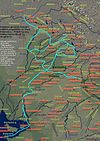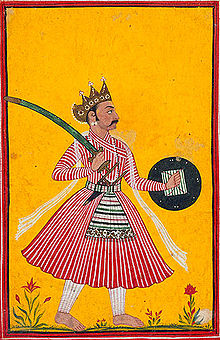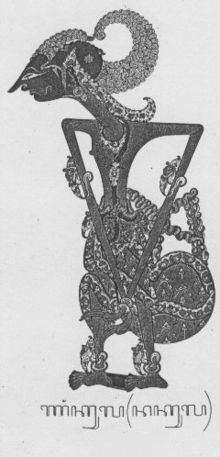- Nakula
-
 Nakula's military expedition to the western kingdoms, as per epic Mahabharata. He seemed to have followed the Uttarapatha route.
Nakula's military expedition to the western kingdoms, as per epic Mahabharata. He seemed to have followed the Uttarapatha route.
Nakula, also spelt "Nakul" (Sanskrit: नकुल, naküla,'twin) was one of the five Pandava brothers according to the epic Mahābhārata.[1] Nakula and Sahadeva were fraternal (non-identical) twins born to Madri, who had invoked the Ashvins using a mantra for a son, the mantra shared by Kunti. (The Ashvins were divine physicians.) As soon as Nakula and Sahadeva were born, an incorporeal voice said, ‘In energy and beauty these twins shall transcend even the twin Aswins themselves.’
According to record, Nakula and Sahadeva had the special abilities of being able to care for horses and cows. In the Mahabharata, Nakula is described as extremely attractive, ("devastatingly handsome"), supreme in intelligence, and full of love. He was observant and kept a watchful eye on his elder brother Bhima's mischievous and often dangerous pranks. He was compared to Kamadeva, the god of love, due to his good looks. During the 13-year exile of the five Pandava brothers, he smeared himself with dust to conceal his looks from the Kauravas.
Nakula was chosen by Yudhishtira as the one brother to be brought back to life during the exile in forest, when all the other four brothers had died after drinking water from a lake. This was because he was a son of Madri; Yudhishtara, being a son of Kunti, wanted to be fair to both mothers.
Contents
Marriage Alliances
All five Pandava brothers were wed concurrently to Draupadi, and each had a son by her. Nakula's son begotten upon Draupati was named Satanika after a royal sage of that name.(Ref: Mbh 1. 223). Nakula also married Karenumati, the princess of Chedi, and fathered by her a son named Niramitra (MBh.1.95); he also married the daughter of Jarasandha, the king of Magadh, after Bheem (his elder brother) had slain him.
Association with Horses
Nakula's deep understanding of horse breeding and training is documented in the Mahabharat after the death of Narakasura by Krishna. He was a qualified veterinary surgeon specializing in horses. The science of horses was an expertise of western kingdoms, of which Madra was ruled by Shalya, Nakula's maternal uncle.
During the 13th year of the Pandavas' exile, Nakula lived incognito in Upaplavya (the capital of Matsya-Desh) under the pseudonym Arishtanemi, and looked after King Viraat's royal horses.
Astrological Abilities
Nakula was a great astrologer, but he could say something about the future just once, after which he used to forget what he had said. Before the epic Mahabharta War started, Duryodhana approached Nakula asking him who would win the war. Nakula replied that the army of the one could can hoist his flag on the stone of a mountain would win the war. As soon as he said this to Duryodhana, he forgot what he had said, but Bheema heard it. Duryodhana sent his army and men to hoist a flag at a particular mountain. Bheema ran alone. Duryodhana's men were able to reach the mountain before Bheema could. Bheema fought them and put a few of them down, but he had forgotten to carry the flag of his side. He was clad only in his underclothes ('Gerua'), which he hoisted as his side's flag.
Other Talents
Nakula also had the relatively lesser-known talent of dodging rain. He could ride a horse in rain without getting wet (see external link).
Nakula's Battles
Like his brother Sahadeva, Nakula became an expert swordsman under the guidance of Kuru preceptor Drona. A chapter (Mbh 12.165) in the Mahabharata is dedicated to Nakula's conversation with his grandfather Bhishma on the subject of the sword, its history and its use. His expertise in the use of the sword, along with his ability to use that weapon riding a horse, could be why his elder brother Yudhisthira chose him as the general for their military expedition to the western kingdoms. The western kingdoms were considered to possess expertise in warfare involving horses, using the swords as the main weapon. In the Mahabharata one chapter (Mbh 2:31) is devoted to Nakula's expedition to the western kingdoms, to collect tributes from the kings, for king Yudhisthira's Rajasuya sacrifice. Nakula had followed the Uttarapatha route or some route parallel to it, that leads to the western countries. He was mentioned as battling with Yavana's (Indo-Greeks) in his journey to the west. He also seemed to have followed the route leading to Dwaraka from the western countries. He encountered the Sudras and Abhiras dwelling in the Saraswati river basin.
Nakula was one of the Pandava-generals in the Kurukshetra War, under the generalissimo Dhristadyumna. Nakula slew prominent war-heroes on the enemy side, including, on the 17th day of battle, the Gandhaar prince Ulooka, son of Shakuni.
References
- ^ Selections from Prem Sãgar and Bãgh-O Bahãr (translated into literal English with copious notes, having a table, shewing the genealogies of Krishn Chand, King Kans, and the Kauravs and Pānḍavs), Chaturbhuja Misra (translated by Adalut Khan), Baptist Mission Press (Calcutta), 1881 on Google Books
- Dictionary of Hindu Lore and Legend, Anna Dhallapiccola, ISBN 0-500-51088-1
Mahabharata Kuru Kingdom Santanu · Ganga · Bhishma · Satyavati · Chitrāngada · Vichitravirya · Ambika · Ambalika · Vidura · Dhritarashtra · Gandhari · Shakuni · Pandu · Kunti · Madri · Yudhisthira · Bhima · Arjuna · Nakula · Sahadeva · Duryodhana · Dushasana · Yuyutsu · Dushala · Draupadi · Hidimbi · Ghatotkacha · Ahilawati · Subhadra · Uttara · Ulupi · Chitrāngadā · Abhimanyu · Iravan · Babruvahana · Barbarika · Parikshit · JanamejayaOther characters Karna · Drona · Amba · Vyasa · Krishna · Satyaki · Dhristadyumna · Sanjaya · Virata · Kichaka · Kripa · Ashwatthama · Ekalavya · Kritavarma · Jarasandha · Mayasura · Durvasa · Jayadratha · Balarama · Drupada · Hidimba · Shalya · Adhiratha · ShikhandiOther Hindu deities and texts Gods 
Goddesses Texts Hinduism · Hindu mythology · Indian epic poetry External links
A proposed explanation for Nakula's ability to ride without getting wet: http://www.ias.ac.in/resonance/Jan1997/pdf/Jan1997p44-52.pdf
Categories:- Characters in the Mahabharata
Wikimedia Foundation. 2010.


